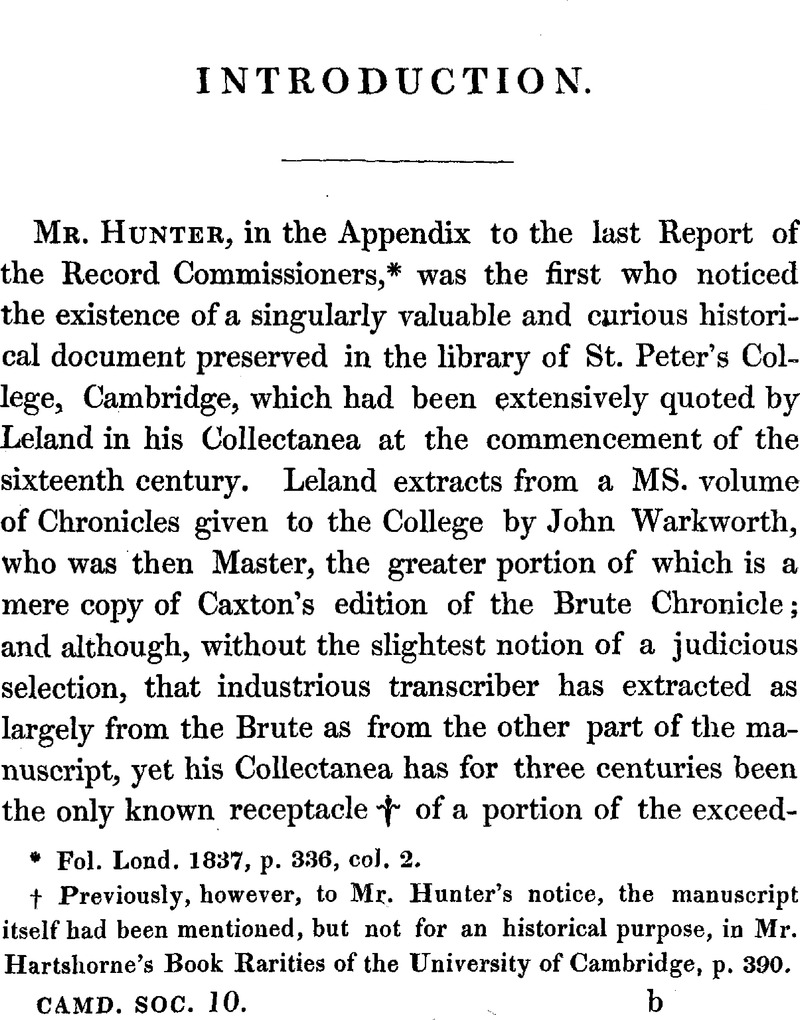No CrossRef data available.

page ix note * Fol. Lond. 1837, p. 336, col. 2.
page ix note † Previously, however, to Mr. Hunter's notice, the manuscript itself had been mentioned, but not for an historical purpose, in Mr. Hartshorne's Book Rarities of the University of Cambridge, p. 390.
page x note * Original Letters. Second Series, vol. i. p. 94.
page x note † Gentleman's Magazine, 1791, vol. 61, Pt. i. p. 222.
page xiii note * De virtutibus et miraculis Regis Henrici, pp. 301 et 303.
page xiv note * MS. Douce, Bib. Bodl. Oxon. No. 302, fol. 29, vo, a. A folio volume on vellum containing poems by John Awdlay, the blind poet, and (fol. 22, vo, b.) written in the Monastery of Haghmond in the year 1426. Mr. Hartshorne will use this MS. in his forthcoming Shropshire Glossary. I may refer here to four Latin verses on Henry the Sixth in MS. Bodl. 926. Laud, 670. E. 3. (Bern. 61.)
page xv note * The catalogue of authorities for the murder of Henry VI. might be extended ad libitum, and do not show more than the popular opinion after all; it may be as well, however, to give a few references. L'Art de verifier les Dates, i. 816, col. i.; Harl. Miscell. i. 313; Life of Henry the Sixth (8vo. Lond. 1712), p. 58; Grafton's continuation of Harding's Chronicle, Sir Henry Ellis's edition, p. 460; “Rex Henricus occiditur clam in Turri,” MS. Tanner, Bodl. II. fol. 104, vo. and fol. 56, ro; Hist. Anglic, a M. H. 1640, p. 180; Cooper's Chronicle, p. 267; MS. Harl. 2408; Palmesii Continuatio Chron. Eusebiani, edit. 1483, fol. 160, ro; Mémoires Olivier de la Marche, sub anno 1469; Lilii Chronicon Anglise, edit. 1565, fol. 63, ro; the Breviat Chronicle of the Kings of England, edit. Cant. 1553, ao. 1470; MS. Vine, in Coll. Arm. 418.
page xvi note * The Historie of Edward the Fourth. Lond. 1640, p. 104.
page xvii note * Rot. Parl. V. 348; Owen and Blakeway's History of Shrewsbury, vol. i. p. 229.
page xvii note † History of England, vol. ii. p. 44.
page xvii note ‡ “And shortly after [his final defeat], to make that parte sure, was deprived of his lief, havinge loste also Edward his sonne the Prynce before spoken of, the hope of all his posteritie, in the Battayle of Tewksbury.” MS. Sloan. 3479. fol. 6, vo. See also MS. Arun-del, Mus. Brit. 28. fol. 25, vo. which contains the only early authority for this view of the transaction.
page xx note * De miraoulis Henrici Sexti, libri duo. MS. Harl. 423, fol.72, ro.
page xxii note * MS. Harl. 2251, fol. 4, ro.
page xxv note * In St. Peter's College there is an original picture of Warkeworthe, executed in 1498, in a clerical habit, holding an open book with both his hands. This was formerly in the curious room called the Stone Parlour, but is now, I believe, transferred to the library. There is the following distich underneath—
“Vives adoptata gaudeto prole; probato Non ouicunque libet, progenuisse licet.”
In the ancient register of donations to the College is a list of books given to the library by Warkeworthe, and from this it appears that he presented his MS. Chronicle in the year 1483.
page xxvi note * MS. Bodl. 3692. Hyp. Bodl. 160. (226.) Tract, sep. ult. fol. 1, ro. A miracle play of the Burial of Christ, of the fifteenth century. I quote this MS. for the purpose of pointing out a curious miracleplay which does not appear to have been hitherto known.